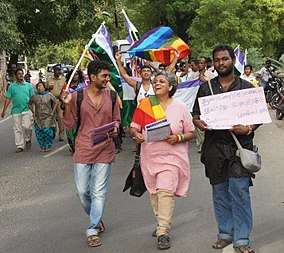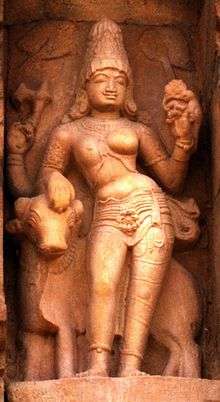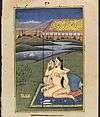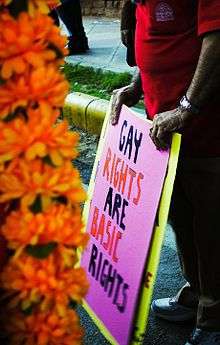LGBT culture in India

India's Supreme Court on September 6, 2018 struck down a colonial-era law that made gay sex punishable by up to 10 years in prison, a landmark victory for gay rights that one judge said would "pave the way for a better future."[2] Time Out (Delhi) has a dedicated column covering gay events in Delhi every week. LGBT have increased access to health services and social events[3]
Sexuality in ancient India


Throughout Hindu and Vedic texts there are many descriptions of saints, demigods, and even the Supreme Lord transcending gender norms and manifesting multiple combinations of sex and gender.[4] There are several instances in ancient Indian epic poetry of same sex depictions and unions by gods and goddesses. There are several stories of depicting love between same sexes especially among kings and queens. Kamasutra, the ancient Indian treatise on love talks about feelings for same sexes. Transsexuals are also venerated e.g. Lord Vishnu as Mohini and Lord Shiva as Ardhanarishwara (which means half woman).[5] Homosexuality was never viewed as a crime, on the contrary, alternative sexuality formed an inalienable part of society.[6] Apart from male and female, there are more than 20 types of genders, such as transwoman, transmen, androgynous, pangender and trigender etc. and in ancient India it was referred to as Trithiya prakirthi[7]
— Gopi Shankar Madurai at National Queer Conference 2013[9]
Media
Internet
Khush-list, the first mailing list for LGBT South Asians, predominantly Indians in metropolitan cities and those living abroad, was established in 1993. In 1999, LGBT-India was established on egroups, and later transitioned to yahoogroups. Such mailing lists, established well before the advent of social networking sites, continue to remain the mainstay for discussion among middle-class, English-speaking Indians, and include LGBT-India, GayBombay, Good As You (Bangalore), Pratibimb (Hyderabad), and Movenpick/Orinam (Chennai). GayBombay.org (established in the late 1998) and Orinam.net (established in 2006) are among the oldest websites that function as online resources catering to a local (Mumbai and Chennai, respectively) and national readership. Dating websites provide an alternative way for meeting people; online communities also offer a safe and convenient environment for meeting gays in India.[10] Online magazines like Pink Pages and Gaylaxy also publish regular issues.

On September 11, 2013, India's first Queer Radio channel, Qradio - Out and Proud, completely dedicated to LGBT audience was launched . With variety of talk shows, music, debates etc., the channel now runs 24 hours a day [11][12]
In February 2014, Wonderful Things Happen was founded with the objective to serve the Indian lesbian/bi women community.
Film and Television Depictions
Though Bollywood has gay and transsexual characters, they have been primarily ridiculed or abused. There are few positive portrayals of late like Onir's My Brother Nikhil, Reema Kagti's Honeymoon Travels Pvt. Ltd., and Parvati Balagopalan's Rules: Pyaar Ka Superhit Formula but they have been sporadic and not mainstream. There have also been a few independent films that deal with homosexuality like Sridhar Rangayan's Gulabi Aaina – The Pink Mirror, Girlfriend (2004 film),Yours Emotionally, 68 Pages and Ashish Sawhney's Happy Hookers. The first Indian film to deal openly with homosexual relations was Fire by Indian-Canadian director Deepa Mehta. With its 1997 release in India it stirred up a heated controversy throughout the country. In 2004 The Journey (2004 film) Malayalam feature film written, directed and produced by Ligy J. Pullappally, inspired both by her short film Uli and a true story of two lesbian lovers in the South Indian state of Kerala. Fire is explicit in stating that the main characters enter their relationship due to the failure of their heterosexual marriages, Sancharram The Journey (2004 film), the Malayalam name for the same movie, The Journey, is clearly a film about two lesbians who fall in love with each other.
Recently, Bollywood has portrayed homosexual relationships in a better light, such as in Dostana and Men Not Allowed. Actors of Indian descent have played homosexual roles in foreign movies. Lisa Ray and Sheetal Sheth played gay roles opposite each other in Shamim Sarif's I Can't Think Straight and The World Unseen. Jimi Mistry played a man trying to come out to his mother in Ian Iqbal Rashid's Touch of Pink.
In 2010, a Tamil film Goa, dealt with gay couples, their love and romance. It was the first Tamil film to portray same-sex love.
In 2016, Aligarh (2016 film) , was released centering on the life of a gay professor who was accused of homosexuality. In Kapoor and Sons since 1921, character portrayed by Fawad Khan was gay.
Indian television has also begun to depict gay characters. In 2011, the popular soap opera "Maryada: Lekin Kab Tak?" (Honour: But at What Cost?) featured a plot line involving a gay couple, and was among a handful of television shows including gay characters.[13]
Portrayal of Homosexuality in Bollywood and Indian Cinema
Bollywood and Indian cinema are not new in portraying homosexual characters on the screen; this is often done in satirical, comical, or stereotypical ways. Many contemporary Bollywood films, such as Kal Ho Naa Ho, Dostana, Kapoor And Sons, and Alligarh, to name a few, either have homosexual characters or portrayals of homosexual relationships.[14][15]
Some scholars argue that same sex friendships within Bollywood movies is portrayed for a “gay viewership”.The use of terms such as “yaar” (friend/lover) can be seen as a way to deter from using the language of “homosexuality” or “gayness” due to the current legal and political circumstances, since homosexuality is illegal and is a criminal offense.[16]
In recent movies, there has been a move away from the portrayal of homosexuality in a satirical and comedic way, and instead showing a more sensitive, and empathic representation of the struggles that the community has to face. Aligarh and Kapoor And Sons are two of the more recent blockbuster Bollywood movies, both released in 2016, that have made an impact on the portrayal of homosexuality in Indian media.These movies are turning a new page for the role of homosexuality in Bollywood by challenging the previous stereotypical roles portrayed on screen. This is achieved by portraying homosexuality in a new, more truthful and complex light than has been done previously.[14]
The movie Aligarh, based on a true story, looks at the life of Ramchandra Siras, an Indian author, linguist, and professor at Aligarh Muslim University. Siras was found dead on April 7, 2010; his death was initially deemed as suicide, but later confirmed as murder. Two months earlier, on February 8, a video was released of Siras having same-sex relations with another man. The video was taken forcefully by people who broke into the professor’s house. Following the release, Siras was suspended from the university and evicted from university housing.[17][18]
The release of Aligarh was very controversial, especially due to the status of homosexuality in India. The film was flagged by the Indian censor board, Central Board of Film Certification (CBFC), that decided to release the movie trailer with an ‘A’ certification, which is similar to an “R” rating in the United States. The BJP (Bhartiya Janta Party) mayor of Aligarh (city in Uttar Pradesh where Aligarh Muslim University is located) Shakuntala Bharti, was in support with various groups to unofficially ban the movie from screening in the city. Bharti stated, “We had issued a warning that we will not allow this film to be shown in the city at any cost. Ten days ago, we lodged our protest against the screening of the movie”. The movie was not shown in various movie theaters in the city, as this group, including the mayor, believed that the movie linked the city to homosexuality, which would be equivalent to defamation.[19][20] In the rest of the country the movie was released with cuts recommended by the Indian censor board.[21]
Actor Manoj Bajpayee, who plays the main role of Ramchandra Siras, received the Filmfare Critics Award for best actor for his role in the movie. Writer of the film, Apurva Asrani, stated that this was a win for India’s LGBTQ community.[22] The movie exemplifies the troubles that the LGBTQ community in India has to face due to the existence of S377, which is the law that criminalizes homosexuality. The movie was released at the time were the voices of the “right-wing extremists” were growing. Some within the field of cinema, state that Bollywood’s acceptance of homosexual characters is slow, and it will be a while for “gay” characters to be featured as “normal”. “Section 377 will eventually be thrown out,” said Hansal Mehta, the director of the movie Aligarh. He further said, “Aligarh is part of that larger history that this country is going to experience.” Similar issues arose in the making of Kapoor and Sons, where five actors rejected the role of the “gay” lead before Pakistani actor Fawad Khan accepted it. “Mr. Batra and the movie’s producers, aware that the film’s plot line could be commercially risky, decided to avoid any mention of same-sex relationships in the movie’s promotions.” Shakun Batra, the director of the movie, explained by saying “A big part of our society is homophobic,” and he did not want to alienate audiences by publishing that this is a “coming out” story. These movies show a move away from the comic roles of homosexual characters in the past towards a more sensitive and empathic portrayal.[14]
Indian Queer Film Festivals
Other than specific Bollywood films that showcase homosexual characters or relationships, Indian Cinema in general has been branching out; one way is through queer film festivals that are held in India.
KASHISH Mumbai International Queer Film Festival is one way through which film is urging for change in the way that the Indian community views homosexuality. The festival includes films from around the world, including Indian queer films.[23]
Bangalore Queer Film Festival, is another film festival that has been running since 2008. The festival showcases both Indian and international films. The festival also seeks to voice concerns and issues that the LGBT community faces. In 2017, the festival featured 55 films from 21 countries.[24]
Chennai International Queer Film Festival also known as Reel Desires: Chennai International Queer Film Festival is a three-day event that usually takes places on the last weekend of July. It main organisers are Orinam in partnership with Goethe-Institut, Chennai along with volunteers from various community groups and NGOs, including Nirangal, East-West Center for Counselling, RIOV and SAATHII. They screen short films as well as Feature-length films from all over the world. The last day is usually performances along with a panel discussion, usually to discuss and bring out the challenges faced by community members.[25] In 2014, the event had a photography exhibition, featuring queer/trans photography Shilpa Raj.[26]
Calcutta International LGBT Film & Video Festival, also known as DIALOGUES: Calcutta International LGBT Film & Video Festival, was first launched in 2007.[27] It’s a three-day festival that happens in the November each year. This Film Festival was started by 'Sappho For Equality' and 'Pratyay Gender Trust', along with Goethe-Institut /Max Mueller Bhavan, Kolkata.[28]
Delhi International Queer Theater and Film Festival is organised in Delhi by Harmless Hugs. There has been three consistent editions of this festival since 2015 and has received support from celebrities like Kalki, Kunal Kapoor and Piyush Mishra.[29]
Celebrity Support to Decriminalize Homosexuality
Celebrities, represented in the general Indian media, have voiced their opinions and have advocated for the LGBTQ community in the country.
After the 2013 Supreme Court Decision to reinstate S.377, the court agreed to refer the decision to a five judge constitutional bench based on a curative petition. Many celebrities, have voiced their support for the curative petition and the decriminalization of homosexuality, by repealing S.377. A news article by Akshay Kaushal in the Hindustan Times (Feb. 3rd, 2016), outlines some of these public comments; this includes: Onir, one of the few openly gay film directors who stated, “Now hopefully the five-judge constitution bench will take the decision in our favour. And this law should have been scrapped the day the Britishers left India. So hopefully, the 2009 verdict of the Delhi Court, that decriminalized gay sex among consenting adults, will be back soon.” Delhi-based fashion designer, who married his partner Rahul Arora stated, “I am hopeful and positive that the five-judge constitution bench will scrap section 377 and make this country a better place for us to live”. National Award-winning filmmaker Apurva Asrani, who wrote the film Aligarh, when referring to the five-judge constitutional bench stated, “the Supreme Court has allowed itself a chance to redeem itself from a blemish on its otherwise spotless image.” “This (homosexuality) has been accepted even in our Hindu scriptures. I stand by my gay friends” said Actor Raveena Tandon. “Today’s decision is a great step. However, I think a disparity that can easily be addressed by amending the Indian Penal Code shouldn’t have to be a 15-year-long struggle” said actor and gay rights activist Celina Jaitley.[30]
Along with the curative petition, submitted by NGOs, to the Supreme Court of India, leading to the five-judge constitutional bench to re-consider the repeal of section 377, a petition was filed by five gay celebrities.
The petition was covered by various news articles, including The Times of India, stating, “The petitioners are lesbian, gay and bisexual (LGBT) citizens of India whose rights to sexuality, sexual autonomy, choice of sexual partner, life, privacy, dignity and equality, along with the other fundamental rights guaranteed under Part-III of Constitution, are violated by Section 377.” This is the first time those that are directly effected by the 2013 decision have addressed the court in his manner. The petitioners are, NS Johar (dancer), Sunil Mehra (journalist), Ritu Dalmia (chef), Aman Nath (hotelier), and Ayesha Kapoor (business executive).The petition was not reviewed or added by the Supreme Court; stating that there are already petitions of the same nature that the court is reviewing at the moment, and advised the celebrities to wait till the decision is out before further pursuing this issue.[31]
Events
.jpg)
While the discussion on homosexuality is happening in India, the below pride parades have been established in various major cities of India:
- Bengaluru Pride (2008)
- Chennai Pride (2009)
- Chennai Rainbow Film Festival (2013)[32]
- Bhubaneswar Pride (2009)
- Hyderabad Pride (2013)
- Chandigarh Pride (2013)
- Delhi Queer Pride Parade (2008)
- Mumbai Queer Azaadi March (2008)
- Kolkata Rainbow Pride Walk (1999) - This is the first pride march to be organised in South Asia, that was organised by members of the support group Counsel Club, and witnessed participants walking down the streets of Kolkata starting from Park Circus Maidan.
- Pune Pride (2011, second to be established in Maharashtra)
- Ahmedabad Pride Parade (2009)
- Kerala Queer Pride (2010)
- Asia's first Genderqueer pride parade and Alan Turing Rainbow festival, Madurai (2012)[7]
- Bhawanipatna Pride (2012)[33]
- Guwahati Queer Pride Parade (2014)
- Cochin Queer Pride (2014)
- Queer Gulabi Pride Jaipur (2015)
- Dehradun Pride (2017) [34]
- First Gujarat state LGBT pride parade in Surat (2013)[35]
- Baroda (2014) [36]
- Kerala Queer Pride 2015 at Thiruvananthapuram[37]
- Orange City LGBT Pride March, Nagpur (2016) [38]
- Lucknow (9 April 2017)- Awadh Pride was the first such event to take place in the state of Uttar Pradesh [39]
- Bhopal Pride (2017) - the first Pride event to take place in the state of Madhya Pradesh
- Jamshedpur Pride (2018) [40]
A tradition in Indian pride parades is the wearing of colorful masks for the partial purpose of hiding the wearers' identities from public view and avoiding altercations with family members. This is expected to change as less reprisals are feared from the general public, as shown with the inaugural Pune Pride Parade in December 2011, which required participants to dress professionally and avoid wearing masks or colorful makeup.
Participants in the parades hail from various indigenous gender and sexual minority groups and infuse the largely-Western-derived aesthetic of pride with local and national cultural trappings. Western and international tourists also participate in pride celebrations in India.
The Free Hugs Campaigning conducted in Kochi (Ernakulam)[41] and TVM in Kerala.
Organizations
There are many organizations in many cities of India, such as Humsafar(Mumbai), Alternative Law Forum (Bangalore), Sangama (Karataka), Chennai Dost and Nazariya[42] (Delhi NCR) are working for LGBT rights. There are also organisations which function nationwide like Human Rights India and Gaysi. Many of these organizations operate in a very informal way and locally funded.[43] In Kerala, organization named Queerla given a new face to LGBT rights. Apart from Non governmental organization's and Community based organisation's LGBTQIA+ student movements which are registered under the government of India are Srishti Madurai a student volunteer LGBTQIA and Genderqueer movement based at Madurai.[1] In June 2016, a platform named [Amour | amour.lgbtq.co.in] is launched in India to help LGBTIQ community members find long term companions.[44]
References
- 1 2 "One Who Fights For an Other". The New Indian Express.
- ↑ "India's Supreme Court strikes down law that punished gay sex". ABC News. Retrieved 6 September 2018.
- ↑ "Fear and loathing in gay India". BBC News. 17 May 2005. Retrieved 17 April 2008.
- ↑ ritiya-Prakriti: People of the Third Sex, p. 40
- ↑ "GALVA-108: Gay & Lesbian Vaishnava Association". GALVA-108: Gay & Lesbian Vaishnava Association. Retrieved 22 August 2015.
- ↑ "What went wrong for gays in India?". Retrieved 22 August 2015.
- 1 2 Karthikeyan, D. (2012-07-30). "Cities / Madurai : Madurai comes out of the closet". Chennai, India: The Hindu. Retrieved 2012-10-10.
- ↑ Shrikumar, A. (18 October 2013). "No more under siege". The Hindu. Chennai, India.
- ↑ http://www.glreview.org/article/the-many-genders-of-old-india/
- ↑ "Gay Dating Trend In India".
- ↑ "India's First Queer Radio Station Launching on Sep 11". Retrieved 22 August 2015.
- ↑ "Indian queers soon to have their own Radio channel". Pink Pages. Retrieved 22 August 2015.
- ↑ "Indian TV soap operas step out of the closet". Yahoo! Entertainment New Zealand. AFP. 2 October 2011. Retrieved 3 October 2011.
- 1 2 3 Sharma, Vaibhav (26 April 2016). "Gay-Themed Movies in India Fight Back Against Taboos". The New York Times. Retrieved 10 April 2017.
- ↑ Gehlawat, Ajay (2010). Reframing Bollywood: Theories of popular Hindi cinema. India: SAGE Publications. pp. 84–111.
|access-date=requires|url=(help) - ↑ Dinesh Bhugra; Gurvinder Karla; Antonio Ventriglio (2015). "Portrayal of gay characters in bollywood cinema". International Review of Psychiatry. 25 (5): 455–459. doi:10.3109/09540261.2015.1086320.
- ↑ Edmond, Deepu (8 April 2010). "Gay AMU prof found dead in Aligarh home". The Indian Express. Retrieved 10 April 2017.
- ↑ Edmond, Deepu; Madodox, Georgina (19 February 2010). "AMU prof may have been a victim of sting". The Indian Express. Retrieved 10 April 2017.
- ↑ Aghal, Eram (28 February 2016). "Film-maker says he's shocked at mayor's role in 'ban' on this movie". The Times of India. Retrieved 10 April 2017.
- ↑ D'souza, Dipti (28 February 2016). "Aligarh 'banned' in Aligarh, but there's nothing official about it". The Indian Express. Retrieved 10 April 2017.
- ↑ "From bra shots and long kisses, sanskaari censor board has saved India's morality again". The Indian Express. 7 September 2016. Retrieved 10 April 2017.
- ↑ Kameshwari, A (15 January 2017). "Manoj Bajpayee winning Filmfare for Aligarh is huge for India's LGBTQ, says writer Apurva Asrani". The Indian Express. Retrieved 10 April 2017.
- ↑ "KASHISH Mumbai International Queer Film Festival". KASHISH Mumbai International Queer Film Festivals. Retrieved 10 April 2017.
- ↑ Gowallal, Reema (23 February 2017). "Film fest celebrates art in the LGBT community". The Times of India. Retrieved 10 April 2017.
- ↑ "Where the mind is without fear". Retrieved 19 June 2017.
- ↑ "LGBT film fest to focus on identities". Retrieved 19 June 2017.
- ↑ "Dialogues : Calcutta International LGBT Film & Video Festival".
- ↑ "LGBT film fest to focus on sexuality in South Asia".
- ↑ "The LGBTQ Community Has A Friend In None Other Than Singer Piyush Mishra!". Youth Ki Awaaz. 2016-12-16. Retrieved 2018-06-13.
- ↑ Kaushal, Akshay (3 February 2016). "From Celina to Raveena: Bollywood comes out in support of gay rights". Hindustan Times. Retrieved 10 April 2017.
- ↑ Mahapatral, Dhananjay (28 June 2016). "Gay celebs cite right to life, move SC against section 377". The Times of India. Retrieved 10 April 2017.
- ↑ "Film Festival in Chennai, Tamil Nadu: 7th June, 2013". chennaidost.com/chennai-rainbow-film-festival/.
- ↑ "Pride Walk in Bhawanipatna, Odisha: July 13, 2012". Orinam.net.
- ↑ "More than 200 participants at Doon's first pride parade".
- ↑ "First gay parade held in India's Gujarat state". The Daily Telegraph. London. 7 October 2013.
- ↑ Dilip, Mangala. "Baroda's First LGBT Pride Festival: "We Pay Taxes, We do our Duties; Why Don't we have Equal Rights?"". Ibtimes.co.in. Retrieved 6 December 2014.
- ↑ "LGBT Community Organises 'Queer Pride March' in Kerala's Thiruvananthapuram".
- ↑ "LGBT community, supporters take out 'pride parade' in Nagpur". Retrieved 6 March 2016.
- ↑ "Lucknow just held its first Pride Parade and it was truly magnificent". Retrieved 8 June 2017.
- ↑ "75 transgenders take part in 1st Steel City LGBT parade".
- ↑ Karthikeyan, Shruti. "Kochi youth hugging their way to happiness". timesofindia.indiatimes.com. Retrieved 6 December 2014.
- ↑ "The latest to join the movement for the LGBTQ+ community are five students of KNC". www.hindustantimes.com/. 2018-04-11. Retrieved 2018-04-18.
- ↑ "Queer Groups in India & Abroad". Retrieved 22 August 2015.
- ↑ Sawant, Anagha (Jul 22, 2016). "Now, a dating platform for LGBT community". dnaindia.com.